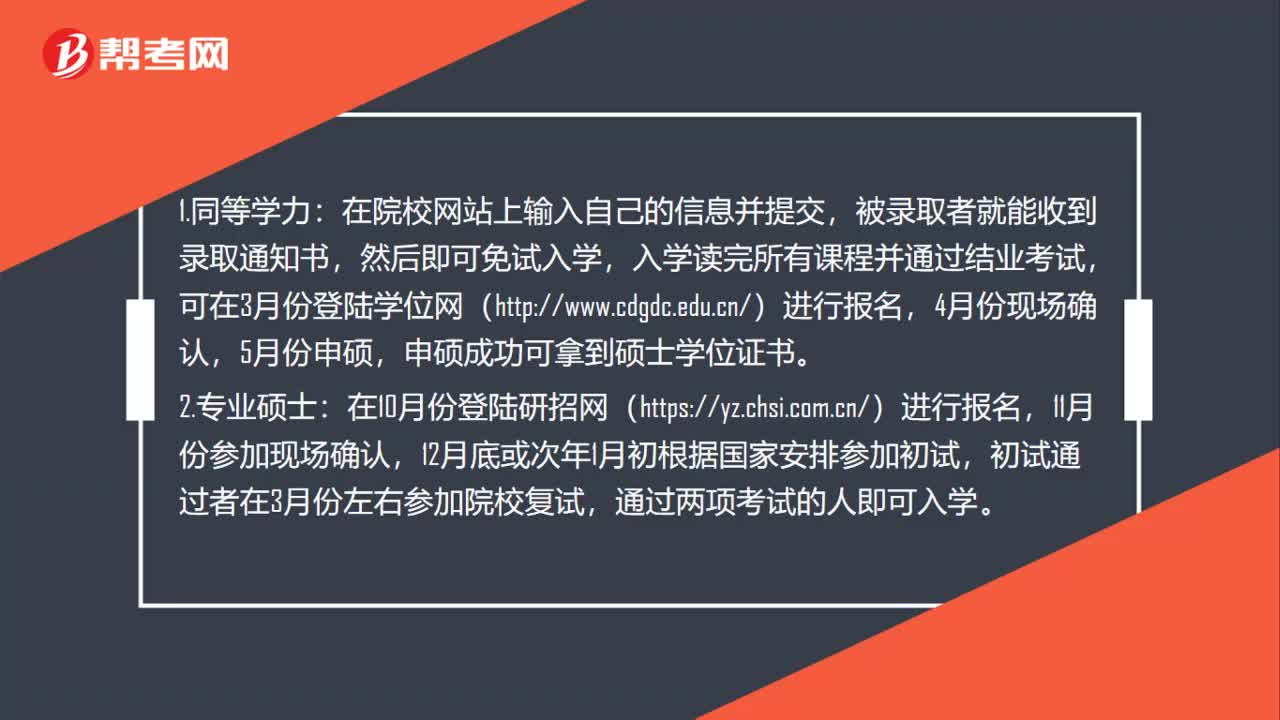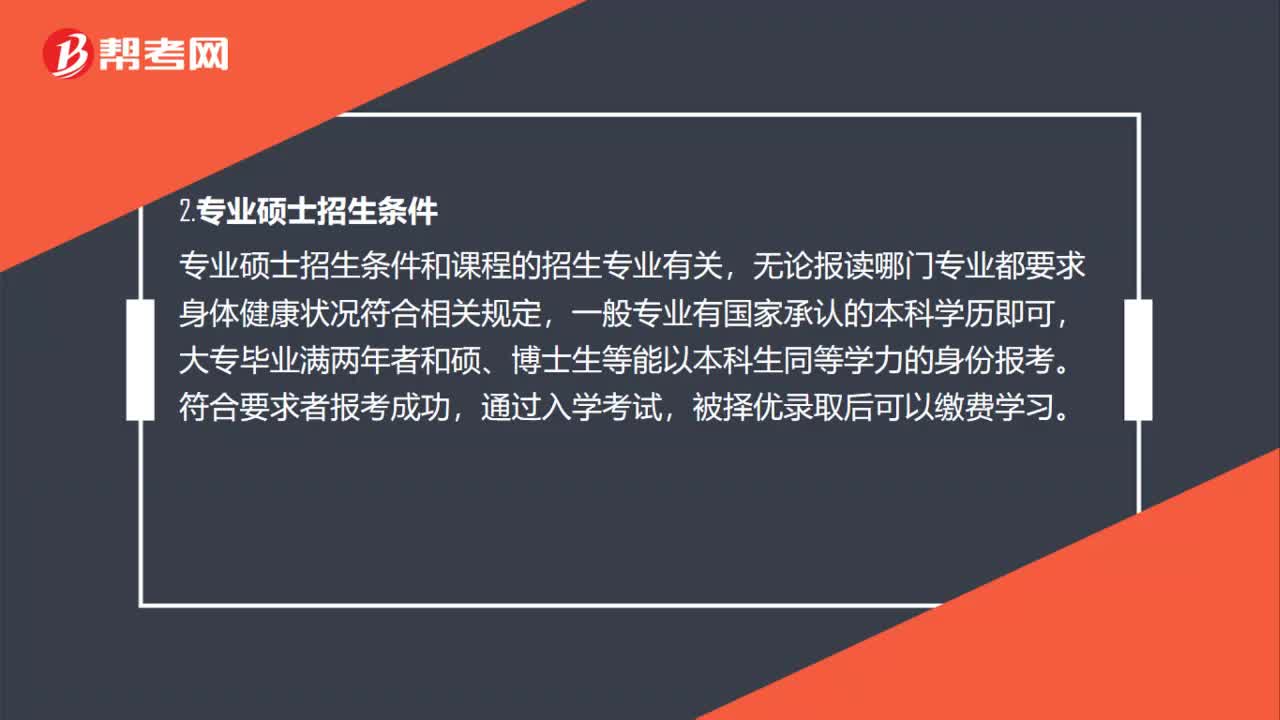


声明:本文内容由互联网用户自发贡献自行上传,本网站不拥有所有权,未作人工编辑处理,也不承担相关法律责任。如果您发现有涉嫌版权的内容,欢迎发送邮件至:service@bkw.cn 进行举报,并提供相关证据,工作人员会在5个工作日内联系你,一经查实,本站将立刻删除涉嫌侵权内容。
 96
96怎么报考在职研究生?:怎么报考在职研究生?在院校网站上输入自己的信息并提交,被录取者就能收到录取通知书,然后即可免试入学,入学读完所有课程并通过结业考试,可在3月份登陆学位网(http:申硕成功可拿到硕士学位证书。初试通过者在3月份左右参加院校复试,通过两项考试的人即可入学。被审核通过者可在收到录取通知书后直接免试入学。在院校招生时间内登录院校网站进行报名,然后等到院校的入学考试通知。
1153播放2020-06-12 27
27专科可以考研吗?:专科可以考研。考研有全日制研究生和在职研究生两种学习形式。其中全日制即全脱产学习,学习时间一般在周一至周五。在职研究生即半脱产学习,学习时间集中在业余时间,专科可以通过适合的形式来考研。
589播放2020-06-12 12
12在职研究生准考证什么时候打印?:在职研究生准考证什么时候打印?准考证打印一般在考试前一周,考试时间为每年的12月下旬或1月初。
1008播放2020-06-12
在职研究生有哪些专业不需要考数学和英语的吗?
白茶与鹿猫巷与你·2021-03-29重庆在职考研,同等学力在职研究生可以异地上课吗?谢谢
chanbiaoxie·2020-01-01中国人民大学英语翻译专业在职研究生怎么样?
beiguosao·2019-11-02我现在在重庆,想读在职研究生,请问大家,有什么好的推荐?
指尖键盘·2019-10-30中国人民大学在职研究生对英语的要求高吗
枳愿再见·2019-10-29重庆大学的在职研究生软件工程怎么样,考试科目有什么?
bingsuoming·2019-10-27大连外国语大学招收在职研究生吗?都什么专业?
benchongwai·2019-10-26西南大学在职研究生招生专业
asheilao·2019-10-24重庆工商大学会计专业好不好考研?在重庆怎么样?
binrunjue·2019-10-15重庆报名在职研究生有什么条件吗?
babaian·2019-07-13
社会在职考研和应届考研有什么区别呢?
baokuotong·2021-03-30在职研究生双证都包括哪两种证书?
chaniuduan·2021-03-30在职研究生定向和非定向有什么区别?
chasentai·2021-03-30同等学力申硕的两个考试科目可以分开考吗?
chaniuduan·2021-03-30专科毕业两年没有升本可不可以直接考研?
cehuachan·2021-03-30在职硕士是什么学历?与全日制研究生一样吗?
bangtoupang·2021-03-30在职研究生免试入学有什么优势吗?
aojudeng·2021-03-30同等学力申硕考试四次都没过,还可以继续考吗?
bengsaifeng·2021-03-30读在职研究生期间辞职或者跳槽对毕业会有影响吗?
chaniuduan·2021-03-30备考在职研究生考试有什么好的方法吗?
caogengqu·2021-03-30
2020年考研历史学冲刺测试题及答案(7.3)
帮考网校·2020-09-122020年考研历史学冲刺测试题及答案(7.4)
帮考网校·2020-09-122020年考研历史学冲刺测试题及答案(7.5)
帮考网校·2020-09-122020年考研历史学冲刺测试题及答案(7.6)
帮考网校·2020-09-122020年考研历史学冲刺测试题及答案(8.1)
帮考网校·2020-09-122020年考研历史学冲刺测试题及答案(8.2)
帮考网校·2020-09-122020年考研历史学冲刺测试题及答案(8.3)
帮考网校·2020-09-122020年考研历史学冲刺测试题及答案(8.4)
帮考网校·2020-09-122020年考研历史学冲刺测试题及答案(8.5)
帮考网校·2020-09-122020年考研历史学冲刺测试题及答案(8.6)
帮考网校·2020-09-12
在职研究生大概多长时间能够拿到证书?
cansuohang·2021-03-29在职研究生考试有哪些考试科目?
chaniuduan·2021-03-29同等学力申硕有报考专业限制吗?
chaniuduan·2021-03-29在职研究生到底是什么意思
banzhaima·2021-03-29在职研究生考试难不难?
baigengshan·2021-03-29在职研究生考试报名时间是多久?
bigexu·2021-03-29报考在职研究生有什么要求
baigangrong·2021-03-29在职研究生就业前景好吗?
beilaochuan·2021-03-29在职研究生有没有用?
chaniuduan·2021-03-29在职考研报名入口都有哪些?
chaniuduan·2021-03-29
 01:36怎么报考在职研究生?
01:36怎么报考在职研究生?2020-06-12
 00:27专科可以考研吗?
00:27专科可以考研吗?2020-06-12
 00:12在职研究生准考证什么时候打印?
00:12在职研究生准考证什么时候打印?2020-06-12
 00:15在职研究生证书如何获得?
00:15在职研究生证书如何获得?2020-06-12
 01:32在职研究生招生条件是什么?
01:32在职研究生招生条件是什么?2020-06-12

微信扫码关注公众号
获取更多考试热门资料














